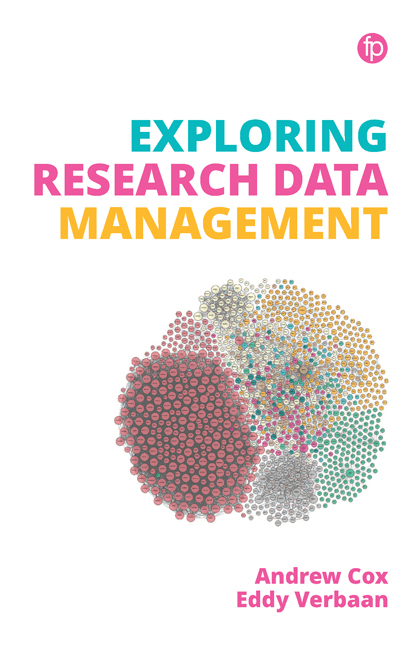Book contents
- Frontmatter
- Contents
- List of tables and figures
- 1 Introducing Research Data Management
- 2 The Social Worlds of Research
- 3 What Are Research Data?
- 4 Case Study of RDM in an Environmental Engineering Science Project
- 5 RDM: Drivers and Barriers
- 6 RDM as a Wicked Challenge
- 7 Research Data Services
- 8 Staffing a Research Data Service
- 9 Requirements Gathering for a Research Data Service
- 10 Institutional Policy and the Business Case for Research Data Services
- 11 Support and Advice for RDM
- 12 Practical Data Management
- 13 Data Management Planning
- 14 Advocacy for Data Management and Sharing
- 15 Training Researchers and Data Literacy
- 16 Infrastructure for Research Data Storage and Preservation
- 17 Evaluation of RDS
- 18 Ethics and Research Data Services
- 19 A Day in the Life Working in an RDS
- 20 Conclusion: the Skills and Mindset to Succeed in RDM
- Index
8 - Staffing a Research Data Service
Published online by Cambridge University Press: 21 September 2019
- Frontmatter
- Contents
- List of tables and figures
- 1 Introducing Research Data Management
- 2 The Social Worlds of Research
- 3 What Are Research Data?
- 4 Case Study of RDM in an Environmental Engineering Science Project
- 5 RDM: Drivers and Barriers
- 6 RDM as a Wicked Challenge
- 7 Research Data Services
- 8 Staffing a Research Data Service
- 9 Requirements Gathering for a Research Data Service
- 10 Institutional Policy and the Business Case for Research Data Services
- 11 Support and Advice for RDM
- 12 Practical Data Management
- 13 Data Management Planning
- 14 Advocacy for Data Management and Sharing
- 15 Training Researchers and Data Literacy
- 16 Infrastructure for Research Data Storage and Preservation
- 17 Evaluation of RDS
- 18 Ethics and Research Data Services
- 19 A Day in the Life Working in an RDS
- 20 Conclusion: the Skills and Mindset to Succeed in RDM
- Index
Summary
Aims
The aim of this chapter is to help you think through the staffing issues around supporting research data management and for a research data service.
New activities and roles
A greater focus on RDM implies some new activities, such as preparing data to be shared or providing training. Or it could imply a redistribution of activities, e.g. from the researcher to someone in an RDS. It may create wholly new roles, especially in the support area or in running a repository. Logically, this creation or redistribution of work can be met in a number of ways:
1 Research teams themselves may take on new tasks, be that the principal investigator or research assistants, e.g. taking on primary responsibility for data management in a project or documenting data at the end of the project.
2 Existing local support staff might take on a role; for example, if an academic department has an IT specialist or someone who helps write project proposals, they might take on some roles associated with RDM. They might offer day-to-day support around storing active data or help write a data management plan.
3 Existing central support staff could add a new role – be they in the library, IT, records management, research administration, staff development, or in a number of other departments. Such new roles could involve anything from adding some slides about RDM to a briefing on information literacy through to running a data repository. This could be on the basis of their existing knowledge and skills or by them having some retraining and upskilling. It might be that a few people have their job significantly changed, or that tasks are widely distributed across a large number of staff in different teams.
4 The organisation could employ new staff to take on the role; perhaps even in a new organisational structure. For example, a new coordinator might be appointed to ensure that all the professional services supporting RDM are moving in the same direction.
Logically there are three other possibilities:
1 Some new activities created in the context of RDM are met collaboratively across a number of institutions. For example, it could be that a local cross-institutional network could take on training of researchers in RDM.
- Type
- Chapter
- Information
- Exploring Research Data Management , pp. 75 - 84Publisher: FacetPrint publication year: 2018

